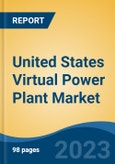Speak directly to the analyst to clarify any post sales queries you may have.
10% Free customizationThis report comes with 10% free customization, enabling you to add data that meets your specific business needs.
Rising In Demand of Renewable Energy and IoT/Cloud Platform Across the Nation
Leading economies across the country are increasingly using renewable energy sources to generate electricity, and this need has emerged as a significant growth driver for the market for US virtual power plants. Additionally, a significant movement from centralized to distributed generation is anticipated to boost demand for virtual power plants and support future market expansion.Growth of the market is credited to the power industry's increasing adoption of cutting-edge technologies like the internet of things (IoT) and cloud platforms, along with the growing awareness of the advantages of renewable energy, the simplicity of obtaining power through platforms for virtual power plants (VPP), and the increasing focus on cost-effectiveness in power generation.
Moreover, the low cost and readily available raw materials has increased competition in the market for PV modules. Regulations are promoting the development of renewable energy, accelerating industrial growth. For instance, Solar power company Sunrun declared in December 2022 that it had been effective in supplying electricity to consumers in the months of June, July, and August via a virtual power plant in Massachusetts that integrated an estimated 5,000 small-scale solar energy installations. This aspect is expected to grow the market further in the forecast period.
Latest Trend of VPP in United States
A significant industry trend that is being examined is the rising investment in the construction of new virtual power plants. The building and operation of a conventional power plant requires large amounts of money. VPP, on the other hand, is a centralized control system that is connected to power generating and transmission units. As a result, it costs less and can combine different dispersed energy resources.Governmental measures have strained national resources, forced reconsideration of switching to renewable energy sources, and delayed reforms to the power industry. For instance, in just 10 years, renewable energy’s segment of US electricity generation gets doubled over - from 10% in 2010 to 20% in 2020. More than 100 gigawatts (GW) of solar and 122.5 GW of wind capacity were available in the nation, in the end of 2020.
Energy storage is a key component for the optimal integration of renewable energy, carrying with it the benefits of compact power generation and a clean, reliable energy supply, both of which are essential in this industry. For instance, according to the U.S. Energy Storage Monitor report, 345 MW of new energy storage systems reportedly went online in the second quarter of 2021.
Market Segmentation
The United States virtual power plant market is segmented based on technology, end user, source, component, company, and region. Based on technology, the market is segmented into demand response, distributed generation, mixed asset. Based on source, the market is segmented into renewables, CHP, energy storage, other local generation. Based on end user, the market can be residential, commercial, industrial (petroleum refining, chemicals industry, metals & mining, others. Based on component, the market is segmented into software and service.Market Players
Major players operating in the United States virtual power plant market include Enel X, EnerNOC, Inc., Comverge, Cpower, ABB Ltd, Siemens AG, Schneider Electric SE, General Electric Company, Flexitricity Limited, AGL Energy, etc.Recent Developments
- The Massachusetts Department of Energy Resources must set a 1,000 MWh energy storage goal by 2025, for instance, as a result of House Bill 4,857 (An Act to Advance Clean Energy), which was created by the state of Massachusetts in the United States in August 2018. Rising solar energy cost competitiveness and governmental efforts to build energy storage systems are therefore expected to increase the demand for VPPs during the forecast period. Funding to hasten the company's goal of installing 26,000 energy storage devices in buildings and residences while integrating them with Swell's 600MWh of virtual power plants (VPP) across the US.
- According to Carrington, Stem (Company located in carrington) is aiming for 'full participation and value' of its VPPs in U.S. wholesale markets by providing voltage support, frequency regulation, renewable energy integration, reserve capacity, and other grid services.
Report Scope
In this report, US Virtual Power Plant Markethas been segmented into the following categories, in addition to the industry trends which have also been detailed below:US Virtual Power Plant Market, by Technology:
- Demand Response
- Distributed Generation
- Mixed Asset
US Virtual Power Plant Market, by End-User:
- Residential
- Commercial
- Industrial
- Petroleum Refining
- Chemicals Industry
- Metals & Mining
- Others
US Virtual Power Plant Market, by Source:
- Renewables
- CHP
- Energy Storage
- Local Generation
- Other
US Virtual Power Plant Market, by Components:
- Software
- Service
US Virtual Power Plant Market, by Region:
- Midwest US
- West US
- Northeast US
- South US
Competitive Landscape
Company Profiles: Detailed analysis of the major companies present in the US Virtual Power Plant Market.Available Customizations
The following customization options are available for the report:- Detailed analysis and profiling of additional market players (up to five).
This product will be delivered within 1-3 business days.
Table of Contents
Companies Mentioned
- Enel X
- EnerNOC, Inc.
- Comverge
- Cpower
- ABB Ltd.
- Siemens AG
- Schneider Electric SE
- General Electric Company
- Flexitricity Limited
- AGL Energy








